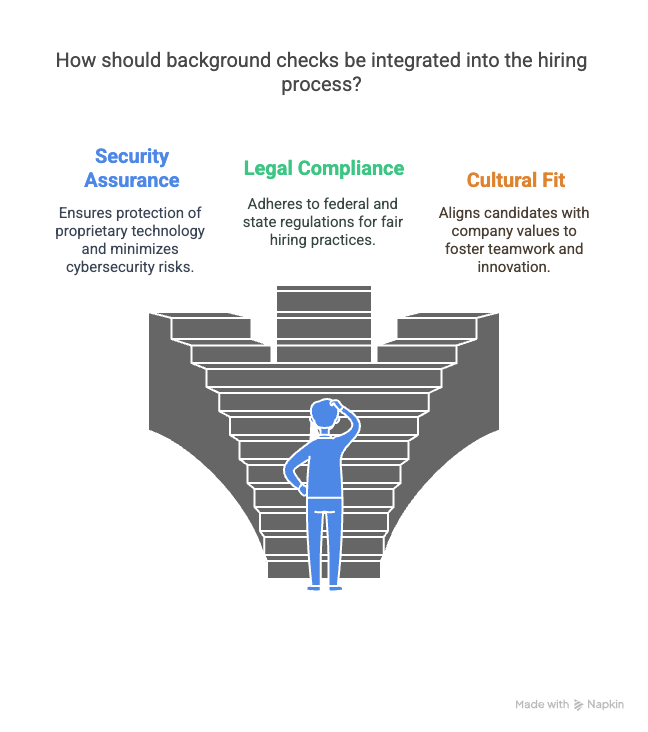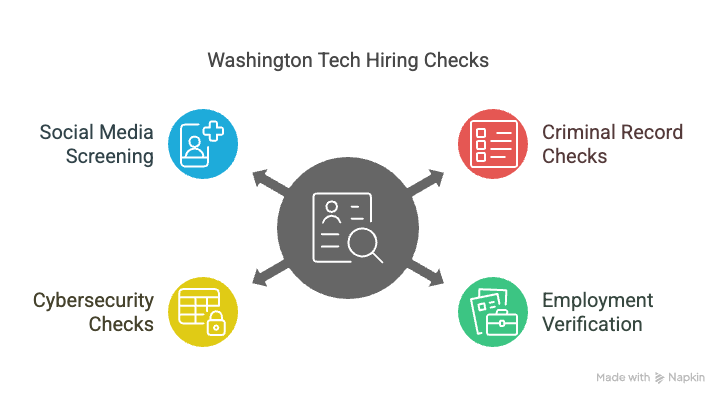Letâs explore the multifaceted world of background checks in Seattleâs startups. Weâll look at legal requirements and social dynamics, and extract insights valuable to both employers and job seekers. Understanding these elements can build workplaces that thrive on integrity and innovation.
Key Takeaways
- Background checks in Seattle's tech industry are a necessity to protect sensitive data and maintain trust.
- Legal frameworks like Washington's "ban the box" law impact when you can inquire about criminal histories.
- The rise of remote work challenges traditional screening, requiring digital tools to verify backgrounds effectively.
- Integrating AI and blockchain can enhance the efficiency and reliability of background checks.
- Clear communication and transparency in the hiring process build trust between employers and candidates.
Introduction
Washington State, especially Seattle, stands as a prime location for tech pioneers. With a flourishing startup ecosystem, ensuring security and trust is more than a priorityâit's a necessity. Background checks are now integral to the hiring processes in Seattleâs tech industry.
Tech companies in Seattle face unique challenges. They manage sensitive data and intellectual property, making it crucial to know whoâs on their team. Background checks offer insights into potential vulnerabilities and reinforce security frameworks. They serve as tools to maintain a culture of trust and responsibility, both key in todayâs tech environment.
What can you gain from knowing the inner workings of background checks? A safer, more reliable work environment where innovation isnât just a vision but a realized promise.
The Importance of Background Checks in the Tech Industry
Background checks play a crucial role in the tech industry, particularly in startups where innovation often walks hand in hand with risk. Security and trust are foundational when you're dealing with proprietary technology. The costs of a single cybersecurity vulnerability can be significant, affecting both financial stability and reputation. Background checks help ensure that the people you bring into your company don't pose unnecessary risks.

Federal and state regulations govern how background checks are used. For instance, the Department of Labor provides guidelines to ensure fair hiring practices, which are essential for legal compliance. In Washington State, these regulations help create a level playing field for both employers and job seekers.
Beyond security, background checks assist in measuring cultural fit. They help startups avoid negligent hiring lawsuits that can arise when an employee's past behavior contradicts the employerâs due diligence efforts. Culture is vital in tech environments, where teamwork and trust fuel innovation. Hiring someone who aligns with your company values is as critical as their technical skill set.
Have you considered how these checks might impact your hiring process? Every candidate brings unique skills and experiences, but it's essential to ensure they align with your company's mission without compromising its integrity.
Trends in Seattleâs Startup Screening
Seattle's startups are adapting to stronger scrutiny in background checks due to amplified tech advancements and data security concerns. As companies handle sensitive information and innovative technologies, ensuring trust through thorough checks has become non-negotiable.
Startups are balancing these demands while fostering a diverse workforce. Seattleâs tech scene prides itself on inclusivity, and businesses strive to reflect this in their hiring practices. Conducting comprehensive background checks without compromising on diversity remains a delicate task. Companies often tailor their screening processes to ensure fairness, considering the varying backgrounds of candidates.
Remote work has reshaped traditional background checks. With employees dispersed globally, verifying credentials and past employment has become more complex. Seattleâs startups are leveraging digital tools to streamline this process, ensuring they cross the T's and dot the I's while keeping up with the remote work zeitgeist. Have you thought about how your startup's screening processes evolve with these changes?
Components of Washington Tech Industry Checks
When hiring in Washington's tech industry, especially in the hustle and bustle of Seattle startups, background checks have specific components you need to consider.

Criminal Record Checks: This is often the first step. While important, Washington's "ban the box" law limits when you can inquire about criminal histories during hiring. You can't ask until after the initial application process, ensuring candidates aren't unfairly disqualified early on. Remember, a criminal record doesn't always reflect the candidate's current character or abilities, but knowing it lets you make informed decisions about potential risks.
Employment and Education Verification: In tech, verifying past jobs and degrees is crucial. Fake credentials are more common than you might think. Confirming a candidate's work history helps ensure they have the experience claimed. In a tech-centric world, this means not just looking at job titles but understanding the specific roles and responsibilities the applicant had. Your team needs real skills, not just polished resumes.
Cybersecurity Checks: With the many cybersecurity roles in tech startups, deeper checks are necessary. This may include ensuring the candidate hasn't previously misused systems or data. Experience in ethical hacking or white-hat activities should be thoroughly vetted to ensure it aligns with your company's ethical standards.
References and Social Media Screening: Traditional references are still valuable, but social media screening can provide a broader view. Many candidates today share a lot of their professional and personal lives online. Checking these profiles can offer insights into their professionalism and personality. However, stay mindful of privacy laws and avoid using social media to make discriminatory decisions.
These components ensure youâre not just filling positions, but hiring trustworthy, skilled individuals who align with your companyâs needs and values. Are you rigorously checking these areas in your hiring process? If not, consider what adjustments might need to be made to align with these best practices.
Legal Considerations
Washington imposes specific rules when it comes to conducting background checks. The stateâs âban the boxâ law prevents employers from asking about criminal histories on initial job applications. This law aims to prevent early bias, allowing candidates to be assessed on their qualifications first. However, employers can still inquire about criminal records later in the hiring process, so itâs crucial for applicants to be prepared for that discussion.
The Equal Employment Opportunity Commission (EEOC) offers guidelines to ensure fairness during hiring. Employers must avoid discrimination based on race, gender, and other protected characteristics when using background check results. Violating these guidelines can lead to significant legal troubles, so itâs important to follow them closely.
Handling candidate data requires strict adherence to privacy laws, including getting explicit consent from applicants before conducting checks. Startups must secure this sensitive information properly. Breaches of data security can lead to severe penalties, not to mention reputational damage. As an employer, ask yourself: Is your current process aligned with these legal standards? If not, implementing a compliant procedure should be a top priority.
Technological Impact on Background Checks
Tech is reshaping how background checks are done in Seattleâs startups. Automation and AI bring speed and accuracy. You can now run checks more efficiently while reducing human error. Startups use AI to scan resumes and verify qualifications quickly. This gives hiring teams more time to focus on fitting the candidate into the company culture.
Blockchain technology offers another layer of innovation. Imagine a secure, tamper-proof system for verifying credentials. It confirms authenticity without room for fraud, providing peace of mind for employers and candidates alike.
Digital security checks are vital in protecting sensitive data during hiring. Ensuring your process guards against breaches is crucial. You handle a lot of personal information, so strong cybersecurity measures are non-negotiable. By integrating these technologies, you enhance trust and efficiency in the hiring process.
What tools does your startup use to streamline background checks? Consider how these technologies might fit into your hiring strategy. They might be the edge you need to attract top talent while maintaining a secure hiring process.
Social Implications
Conducting background checks is more than a legal necessity; it's an ethical balancing act. You need to manage rigorous screening while being fair to candidates with past mistakes. This process shouldn't unjustly penalize those who have worked to move past their indiscretions. Reflect on how to maintain this balance. Does your screening process offer a second chance, or does it shut down opportunities?
Reducing bias in background checks is another critical aspect. With decades of experience, I can tell you that bias isn't always obvious. It's often embedded in the algorithms used or in processes that aren't regularly reviewed. Use data and technology purposefully. Regularly audit these tools to ensure they aren't inadvertently disadvantaging certain groups.
Start with clear criteria. Define what counts as relevant information for the role. Focus on skills and experiences that align with the job requirements. This reduces subjective interpretation and helps maintain consistency. Ensure your team is trained to spot and counteract bias during checks.
It's also important to involve diverse voices in this process. Input from varied perspectives can reveal potential biases you might miss. How inclusive is your review team? Diversity within this team encourages more comprehensive and fair evaluations.
Finally, communicate clearly with candidates about the background check process. Transparency builds trust. When candidates understand how their information will be used, they are more likely to engage positively with your organization.
What steps can you take to foster an open dialogue with candidates while maintaining a thorough vetting process? Consider these aspects thoughtfully as you navigate the landscape of background checks.
Actionable Takeaways for Startups
Thorough background checks can protect your startup from potential liabilities. Here's a practical checklist to follow:
Best Practices for Background Checks
- Define your screening goals. Determine what role-specific information you need.
- Choose reliable screening vendors. Ensure they comply with federal and state laws.
- Train your team. Make sure everyone involved understands the process and its importance.
- Regularly review your processes. Stay updated with the latest laws and technologies.
Emphasizing Data Security
- Use secure platforms for candidate data. Avoid email for sensitive information.
- Limit data access. Only authorized personnel should handle personal information.
- Implement encryption. Protect data at all stages with strong encryption methods.
Maintaining Legal Compliance
- Familiarize yourself with local regulations. Knowing Washington state's specific laws and federal guidelines is crucial.
- Collect consent. Obtain clear, informed consent from candidates before starting checks.
- Keep records. Document all steps to prove compliance if needed.
Promoting Transparency and Communication
- Be clear about the process. Explain each step of your background check to candidates.
- Share timelines. Inform candidates when they can expect updates.
- Provide feedback. If you can't proceed with an offer due to check results, communicate respectfully and professionally.
These steps not only protect your business but also build trust with candidates. How can your startup integrate these practices into its existing hiring process?
Seattle's startup scene thrives on innovation and a steady influx of talent. Background checks are crucial here, ensuring that everyone in your team is trustworthy and capable. The essential takeaway? Balance between thoroughness and fairness.
Conclusion
Startups need a solid process. Verify criminal histories accurately while adhering to "ban the box" laws that delay such inquiries until later in the hiring process. This ensures you're making decisions based on qualifications first, not past mistakes. Employment and education credentials must be cross-verified to avoid costly hiring errorsâdo your homework.
The future holds increased reliance on AI and blockchain to smooth these processes, making them quicker and verifiable. Embrace these technologies cautiously, maintaining a keen eye on privacy and accuracy.
You, as an employer, need clarity and communication at each step. Make your process transparent to candidates, explaining what's checked and why. On the flip side, job seekers should engage openly, ready to discuss their histories honestly.
Both sides thrive in a hiring process built on diligence and respect. As technologies evolve, stand firm on clear, fair practices for a robust startup environment in Seattle and beyond.
Frequently Asked Questions (FAQs)
Do WA startups require background checks?
Startups in Washington aren't legally required to perform background checks. However, many choose to do so for informed hiring decisions.
How to verify IT certifications in Washington?
You can verify certifications through the issuing organization's official website. Some companies use third-party verification services for efficiency.
Can non-competes affect tech hiring in WA?
Non-compete agreements can impact hiring. Washington has specific laws limiting their enforceability, particularly for lower-wage employees.
Are expunged records visible to WA tech employers?
Expunged records are generally not visible to employers. They are sealed from public access, making them unavailable in standard background checks.
Do cybersecurity roles require federal clearances in WA?
Federal clearances are necessary only if the cybersecurity role involves handling classified or government-related information.
How to handle international education verification in WA?
Consider using international credential evaluation services that provide reliable verification of international degrees and certifications.
Can a misdemeanor affect tech employment in WA?
A misdemeanor may impact employment opportunities, depending on the role and the employerâs policies. Itâs important to disclose such information honestly.
Whatâs the cost of tech checks in Washington?
Background check costs can vary widely, ranging from $30 to $100 or more, depending on the depth and services requested.
Do WA tech companies check social media?
Some companies review social media profiles as part of their hiring process. This is used to assess character and cultural fit.
How to screen remote tech workers in WA?
Use video interviews, skills assessments, and verified platforms for conducting background checks to ensure comprehensive screening for remote roles.
What is the process for updating tech skills in WA?
You can update tech skills through online courses and seminars offered by institutions like UW Professional & Continuing Education.
Are tech internships common in WA?
Tech internships are prevalent in Washington, especially in Seattle. Companies use them to recruit and train future employees.
How do remote work policies in WA affect tech firms?
Remote work policies impact recruiting and retention. They provide flexibility but require structured communication and management tools.
Is there support for women in tech in WA?
There are several initiatives and organizations in Washington promoting women in tech, offering networking, mentoring, and educational opportunities.
Definitions
Background Checks
A background check is a process to verify a candidateâs personal, professional, and criminal history before making a job offer. It may include criminal record searches, employment and education verification, and references. Tech companies in Seattle use background checks to reduce risk and ensure security, especially when handling sensitive data.
Cultural Fit
Cultural fit refers to how well a candidateâs values, behaviors, and communication style align with the companyâs work environment and team dynamics. In tech startups, where collaboration and trust matter, a good cultural fit can impact productivity and retention. While skills are important, hiring someone who aligns with your company culture can prevent conflict and miscommunication.
âBan the Boxâ Law
This Washington state law makes it illegal for employers to ask about an applicant's criminal history on initial job applications. The goal is to give all candidates a fair chance. You can still ask about past convictions later in the hiring process. This delay ensures you base early decisions on qualifications, not background.
Employment Verification
Employment verification involves confirming job history provided by a candidate. Employers check past roles, responsibilities, and dates of employment to ensure accuracy. In fast-moving tech companies, this helps identify real experience versus exaggerated claims. Simple errors or dishonest claims can affect hiring decisions.
Equal Employment Opportunity Commission (EEOC)
The EEOC enforces federal laws that prohibit discrimination in the workplace. Their guidelines apply during background checks too. Employers must avoid excluding candidates based on factors like race, gender, or age when interpreting background information. Following EEOC rules protects your company and ensures fair hiring.
References
- Background Check Statistics: https://www.myshortlister.com/insights/background-check-statistics
- Tech Jobs in Seattle: https://www.nucamp.co/blog/coding-bootcamp-seattle-wa-getting-a-job-in-tech-in-seattle-in-2025-the-complete-guide
- Seattle Tech Job Market: https://www.nucamp.co/blog/coding-bootcamp-seattle-wa-most-in-demand-tech-job-in-seattle-in-2025

GCheck Editorial Team
Meet the GCheck Editorial Team, your trusted source for insightful and up-to-date information in the world of employment background checks. Committed to delivering the latest trends, best practices, and industry insights, our team is dedicated to keeping you informed.
With a passion for ensuring accuracy, compliance, and efficiency in background screening, we are your go-to experts in the field. Stay tuned for our comprehensive articles, guides, and analysis, designed to empower businesses and individuals with the knowledge they need to make informed decisions.
At GCheck, we're here to guide you through the complexities of background checks, every step of the way.




